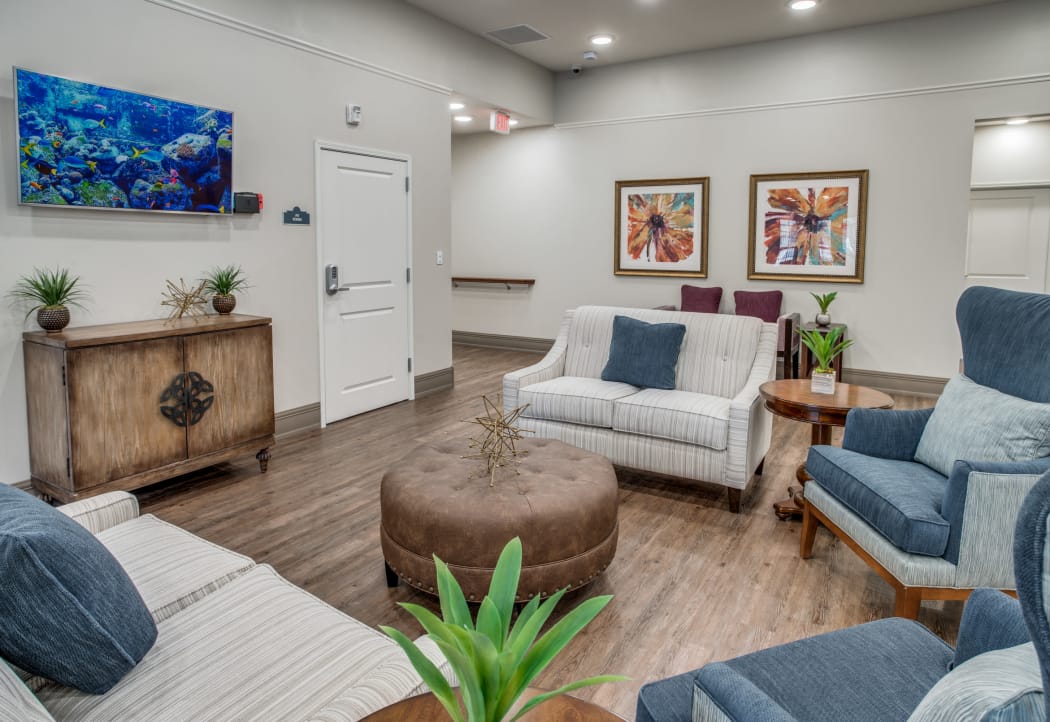Discover Charlotte Memory Care: Committed to Elder Wellness and Health
Discover Charlotte Memory Care: Committed to Elder Wellness and Health
Blog Article
Creating a Safe and Supportive Setting: In-Home Memory Care Essentials
Establishing a safe and nurturing atmosphere for individuals needing in-home memory treatment is vital to their wellness and quality of life. From making certain safety and security within the living space to using efficient communication strategies and implementing memory-friendly layout aspects, there are important parts that contribute to an all natural treatment approach. By concentrating on creating an encouraging community that satisfies the unique requirements of those with memory impairments, caretakers can considerably improve the daily experiences of their loved ones.

Safe Living Environment
Producing a hazard-free and safe and secure living atmosphere is vital when supplying at home memory look after individuals with cognitive disabilities. Making certain the security of the private with memory loss is vital to stop crashes and advertise a sense of wellness. One important element of developing a safe living atmosphere is to get rid of any possible hazards that might cause slides, trips, or drops. This includes protecting loosened carpets, ensuring sufficient lighting in all locations of the home, and maintaining paths free from mess.
In addition, it is necessary to set up security attributes such as grab bars in washrooms and handrails along staircases to offer support and avoid mishaps. Furthermore, utilizing innovation such as movement sensors and alarm systems can signal caretakers if the specific wanders or remains in distress. Producing a risk-free living setting additionally entails applying methods to avoid roaming, such as using door alarm systems or locks to restrict accessibility to harmful locations. By prioritizing safety and security steps and eliminating prospective risks, caregivers can supply a helpful and protected setting for people with cognitive disabilities obtaining in-home memory care.
Efficient Communication Approaches
Executing tailored interaction techniques is essential in fostering purposeful interactions with individuals with cognitive disabilities in the context of at home memory care. Effective interaction plays an essential role in creating a supportive environment that improves the health and high quality of life for individuals with memory problems. When communicating with someone experiencing cognitive decrease, it is necessary to utilize clear and simple language, keep a tranquility and positive tone, and give visual signs to aid understanding.
One key approach is to exercise energetic listening, revealing empathy, perseverance, and respect throughout conversations. Non-verbal cues such as facial expressions and body movement can also aid communicate understanding and support. Furthermore, utilizing memory therapy by making use of or talking about previous experiences music and art can take advantage of long-lasting memories, stimulating and sparking connections engagement.
Additionally, incorporating normal regimens and regular interaction patterns can supply a feeling of knowledge and security for individuals with memory disabilities. By executing these communication methods, caretakers can develop meaningful connections and promote a feeling of convenience and rely on the in-home memory treatment setup.
Memory-Friendly Layout
Offered the significance of creating a helpful atmosphere for people with memory concerns through reliable communication methods, the consolidation of memory-friendly design elements in the living area ends up being critical in maximizing their everyday experiences and overall health. Memory-friendly layout have a peek at this site concentrates on improving safety, convenience, and self-reliance for individuals with cognitive problems. Straightforward adjustments can make a considerable distinction, such as utilizing contrasting colors to boost exposure and minimize confusion, including clear signage to assist navigating, and lessening clutter to stop sensory overload.
Including familiar components from the person's past, such as favorite things or individual pictures, can stimulate positive memories and develop a sense of knowledge. Additionally, ensuring appropriate lighting degrees, mounting grab bars in restrooms, and applying non-slip floor covering can help protect against falls and injuries. Creating a relaxing and soothing environment with using familiar aromas, soft textures, and relaxed audios can also advertise leisure and reduce anxiety. By incorporating these memory-friendly design aspects, caretakers can give a encouraging and safe living area that makes it possible for people with memory issues to preserve their freedom and quality of life.
Daily Routine Planning
When establishing an everyday routine for individuals with memory issues, cautious preparation is vital to sustain their cognitive feature and total health. Developing an organized routine can assist minimize anxiousness, confusion, and disorientation frequently experienced by those with memory disabilities. Begin by incorporating acquainted tasks that align with the individual's choices and rate of interests. Uniformity in everyday routines can provide a complacency and security, aiding in the conservation of cognitive abilities.
It is crucial to enable ample time for every activity, minimizing the need to hurry and avoiding possible disappointment. Simple tasks like dish times, personal care, drug management, and workout should be integrated into the regimen. Additionally, integrating normal periods of rest and leisure can prevent fatigue and frustration. Flexibility is essential, as some days might require changes based upon the individual's mood and energy degrees. Routinely examining and adapting the daily routine will certainly aid ensure its efficiency in advertising a calming and positive environment for individuals with memory challenges.
Support Group Implementation
Developing a robust network of supportive people plays a pivotal role in enhancing the top quality of treatment and health for people calling for memory assistance. Member of the family, good friends, health care experts, and community resources can all add to developing a solid assistance system. Interaction amongst these individuals is important to guarantee that the needs of the specific with memory challenges are fulfilled properly.
Household members are frequently the main caretakers and form the backbone of the assistance system. They offer day-to-day care, psychological assistance, and companionship. When required to avoid burnout and make sure the finest possible care for their enjoyed one., it is important for household members to look for assistance and break.
Along with household support, involving medical care professionals such as registered nurses, doctors, and therapists can offer customized care and support. These specialists can offer important understandings, clinical advice, and support in taking care of the person's condition.

Final Thought
To conclude, creating a safe and helpful setting for individuals with memory care needs is vital for their wellness. By establishing a secure living environment, utilizing effective communication techniques, integrating memory-friendly style aspects, intending day-to-day regimens, and applying a solid assistance system, caretakers can assist boost the lifestyle for those with amnesia. These crucial parts collaborate to produce a nurturing and encouraging setting that promotes independence and enhances total top quality of life.
Developing a hazard-free and safe and secure living environment is extremely important when giving at home memory care like it for individuals with cognitive impairments. By focusing on safety actions and getting rid of prospective dangers, caretakers can supply a safe and supportive atmosphere for individuals with cognitive problems getting at home memory treatment.
Developing a robust network of encouraging people plays a critical role in improving the high quality of care and health for people requiring memory assistance - Charlotte Memory Care. Communication amongst these individuals is important to guarantee that the needs of the specific with memory challenges are fulfilled successfully

Report this page